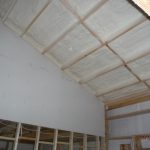The Advantages of Spray Foam Insulation in Pole Barns
S pray foam insulation is an all-in-one solution that can effectively regulate temperature, reduce noise, and prevent moisture in your pole barn. Although all types of insulation minimize heat transfer, spray foam is the only material that can also seal against air leaks, potentially resulting in energy savings of up to 20%. Spray foam insulation is a liquid foam that hardens to form an air and vapor barrier made up of numerous tightly-packed air pockets or “cells” that are resistant to heat, sound, and moisture transfer. The foam also expands up to 30-60 times its original volume before it cures, so it can fill air gaps that traditional insulation materials can’t so easily reach. Spray foam insulation can therefore lower your heating and cooling bills and transform your pole barn into a comfortable and functional living space.
pray foam insulation is an all-in-one solution that can effectively regulate temperature, reduce noise, and prevent moisture in your pole barn. Although all types of insulation minimize heat transfer, spray foam is the only material that can also seal against air leaks, potentially resulting in energy savings of up to 20%. Spray foam insulation is a liquid foam that hardens to form an air and vapor barrier made up of numerous tightly-packed air pockets or “cells” that are resistant to heat, sound, and moisture transfer. The foam also expands up to 30-60 times its original volume before it cures, so it can fill air gaps that traditional insulation materials can’t so easily reach. Spray foam insulation can therefore lower your heating and cooling bills and transform your pole barn into a comfortable and functional living space.
Temperature control
Spray foam insulation tends to regulate temperature better than other types of insulation. Closed-cell spray foam, in particular, has an impressive R-value of around 7 per inch (R-value is simply a measurement of how well a material reduces the flow of heat). And that’s a far higher R-value than most. Just take a look at other popular insulation materials in comparison — fiberglass batts provide around R-2.9 to 3.8 of insulation per inch, while stone wool batts provide R-3.3 to 4.2 per inch on average. The reason for closed-cell spray foam’s effectiveness is its unique structure: the interior cells within the foam remain fully closed and densely packed, which makes it harder for heat and air to flow through them. Alternatively, open-cell spray foam is still a fairly good insulator compared to other materials — providing roughly R-3.5 of insulation per inch — although it isn’t as powerful as closed-cell spray foam. As the cells in open-cell spray foam remain open and aren’t completely sealed, it’s a softer and less dense material. It therefore doesn’t regulate temperature quite as well as its closed-cell counterpart. In terms of price, spray foam insulation is a relatively expensive option, with closed-cell spray foam costing around $1-$1.50 per board foot (144 cubic inches) on average, whereas open-cell costs between $.045-$0.65 per board foot. However, the energy savings provided should offset that initial cost in the long-term.
Noise reduction
Spray foam insulation can also effectively reduce the amount of sound that gets in and out of your pole barn. The barrier created by the interior air pockets in both open- and closed-cell spray foam insulation successfully absorbs noise and minimizes sound transmission. Of course, without adequate insulation, the sound of wind, rain, and nearby traffic can sometimes be a problem inside pole barns due to their metal roofs. So, the noise reduction provided by spray foam insulation is an important benefit for most people, particularly if you need your pole barn to be a calm and peaceful living or working environment. Alternatively, if you use your pole barn for noisy activities (such as, music practice, woodwork, or metalwork) effective soundproofing with spray foam insulation is just as important to prevent noise pollution seeping through to the outside.
Moisture prevention
Closed-cell spray foam insulation also forms a strong vapor barrier that can keep moisture and mold out of your pole barn. Surprisingly, air leaks are actually the biggest reason moisture gets into buildings, accounting for “98% of all water vapor movement in building cavities”, the U.S. Department of Energy reveals. That said, it’s still important to prevent the problem of slow moisture diffusion, which is responsible for the remaining 2% of moisture problems. Closed-cell spray foam insulation can help here as it’s an effective standalone vapor retarder that simultaneously works to prevent the flow of moisture, air, and heat. Open-cell spray foam, on the other hand, is generally too light and airy to be able to form a strong vapor barrier. So, if you do opt for open-cell spray foam, you’ll also need to invest in additional vapor barrier coatings to adequately control moisture levels in your pole barn.
Spray foam insulation — and particularly closed-cell spray foam — is a great choice for your pole barn. It’s an all-in-one solution that effectively regulates temperature, reduces noise, and keeps out moisture to ensure your pole barn stays as comfortable, quiet, and energy-efficient as possible.






